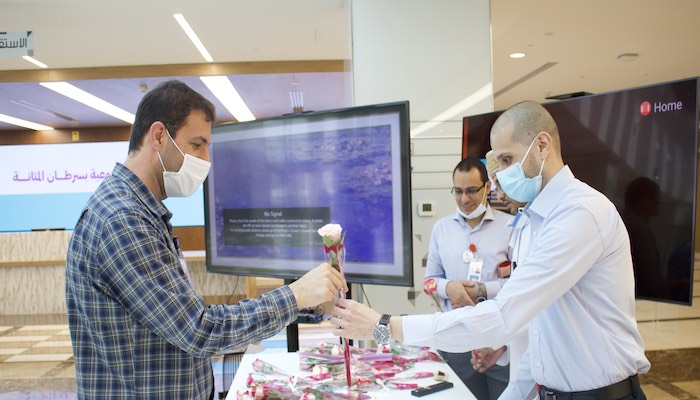
Muscat: As part of World Bladder Cancer Awareness Month, Sultan Qaboos Comprehensive Cancer Care and Research Centre organised an awareness programme about the symptoms, causes and ways to prevent bladder cancer and distributed gifts to patients on this occasion.
Dr Munjid Al Harthi, Consultant in Urological Oncology said: “Bladder cancer is one of the most commonly diagnosed cancers worldwide, and can be associated with significant morbidity and mortality. In Oman, bladder cancer accounts for the second highest number of cases of urogenital cancers amongst males. There are also unique differences between bladder cancers diagnosed in Oman and those diagnosed in Western countries due to different exposure to risk factors associated with bladder cancer in the Middle East and North Africa.”
“There are steps that people can take to minimise your risk of getting bladder cancer. These include, not smoking or quitting smoking tobacco products, taking protective measures to minimise your exposure to harmful chemicals that may be related to your job such as paints and dyes, talking with your family about their medical history to determine if you may have an increased familial risk of bladder cancer, and talking to your doctor if you notice any symptoms related to bladder health such as blood in the urine or burning and pain on urination that that persists over time,” Dr Al Harthi added.
He explained that: “Bladder cancer typically begins in the innermost layer of the bladder wall and if it goes unchecked, may progress to involve the deeper layers and even spread to other parts of the body.” Adding,”The good news is, if it is diagnosed early, bladder cancer is associated with much better outcomes and can be cured compared to if it is diagnosed at a late stage.”
Al Harthi clarified: “In its early stages, bladder cancer is typically treated with a combination of removal of the bladder tumour using minimally invasive procedures, and may also involve chemotherapy or immunotherapy treatments. In its later stages, treatment of bladder cancer may involve a combination of chemotherapy, immunotherapy, surgery and radiation treatment.
In order to ensure that you are getting the best diagnosis and treatment, make sure you receive your care at a centre that specialises in a multi-disciplinary approach to managing cancer.”
“At SQCCCRC, the GU oncology program prioritises timely and efficient diagnosis and treatment that is individualised to the patient. Although this can be a challenging diagnosis, with the right team, good health outcomes and cures are possible. We encourage you to talk to your doctor and family members about bladder cancer in order to decrease the burden of this disease on your loved ones and promote a healthier and happier life for all,” Dr Munjid Al Harthi concluded.